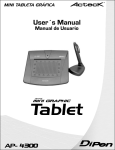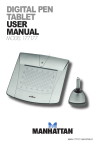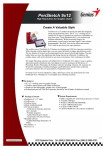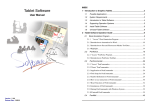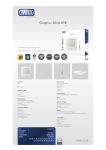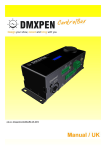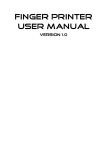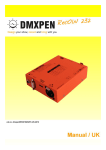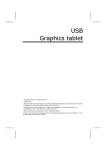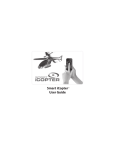Download Manhattan 176040 graphic tablet
Transcript
Graphics Tablet user manual Models 174459, 174572 & 176040 Model 176040 shown MAN-176040/174459/174572-UM-0607-03 introduction Thank you for purchasing the MANHATTAN® Graphics Tablet, Model 176040, 174459 or 174572. Ideally suited for photographers, designers and artists, this professional-quality tablet offers a flexible way to work with Adobe PhotoShop, Illustrator and Flash; Corel Painter; Autodesk Maya and 3D Studio Max; Pro/E; and other popular software applications. Its versatility can also help a wide range of new users find innovative ways to maximize creativity and productivity. The Right Set of Features and Design Tools The lightweight RF wireless pen — with 1,024 pressure sensitivity levels and tilt — enables the creation of computer graphics, technical drawings and other digital documents in a way that’s more natural and instinctive. The programmable buttons are easily customized to suit users and project requirements, and the wireless three-button mouse with scroll uses RF technology instead of a ball or optics for smooth and accurate response, less maintenance and reliable life. The Graphic Tablet’s ambidextrous, low-profile design is a comfortable fit using either hand. Automatic power-save reduces battery drain and keeps both devices ready for use. An integrated menu strip contains built-in hotkeys for on-tablet control of frequent menu commands and application functions. Programmable keys can be set to perform keystroke combinations or launch a menu item without using the mouse and interrupting workflow. A transparent overlay helps protect the active area and easily lifts to help secure documents and photos for tracing. It’s Not Only for Artists It’s more precise and intuitive than a traditional keyboard and mouse combination, as every point on the tablet has a corresponding location on the screen. Cursor positions are matched with pen movements, providing a “pen tablet” function that helps support handwriting recognition for note-taking and meeting minutes, handwritten email and signatures, signature capture and authentication, and pen navigation. The MANHATTAN Graphics Tablet complements digital whiteboards in training, classroom and presentation applications. Easy, Quick Installation for Comfort, Control and Productivity Compatible with Windows and Macintosh systems, the Graphics Tablet includes a driver CD and a USB connection for quick setup without the need for an external power supply. Its low profile, generous cable and adjustable stand (Model 176040 only) combine to provide natural, relaxed working positions to help reduce repetitive motion injury. The easy-to-follow instructions in this user manual help make setup and operation simple, so you’ll also soon be enjoying the benefits of all these popular features, complete with the unsurpassed MANHATTAN Lifetime Warranty. System Requirements • Windows 2000/XP/Vista and Mac OS 9.x or above • System requirements: Pentium III equivalent or higher; 256 MB hard disk space and 128 MB RAM recommended INTRODUCTION installation Software CAUTION: Do not connect the Graphics Tablet to the computer before installing the driver, as this could prevent a proper installation. 1.Insert the driver CD into the CD-ROM drive, and wait for the main menu to appear on screen. NOTE: On most systems, the setup program will start automatically. If it doesn’t, you can start the setup program manually by selecting My Computer ► CD/DVD-Rom ► Open the Drive ► Access/Setup. 2.Select Driver Setup, then press the “Enter” key for all subsequent prompts/questions. 3.After completing the driver installation, restart the computer. A small graphics tablet icon will appear in the system tray, normally at the lower-right corner of the screen, indicating that the driver has been properly installed and the graphics tablet is operational. Hardware Insert the USB connector into an available USB port on your desktop or laptop. After detecting the graphics tablet, Windows will search for and then install the device driver for it. Installation Verification The green LED on the graphics tablet is the primary indicator of operation. The LED normally remains off, turning on and off only in response to various operations and conditions. Check the status of this LED as you go through the following test steps. USB cable Model 176040 shown: See Page 8 for Models 174459 & 174572 LED Barrel buttons Pen stand Adjustable tablet stand, Model 176040 only 1.Tap on any surface with the tip of the pen (or press the left button of the mouse) to “wake it up” if it has gone into standby mode. (The automatic power-saving function may have placed the pen or mouse into standby mode if either of them is not used for a period of time.) 2. Whenever the tablet itself is activated, the green LED will light briefly, then shut off again. 3. When the tablet detects the presence of the pen or mouse, the LED will blink slowly.This happens when the pen tip is held above the tablet or is placed within the tablet’s work area. 4. When you press a button on the pen barrel (or click on a mouse button), the LED will light. 5. Holding the pen or the mouse on or above the work area will make the cursor on the screen move accordingly. INSTALLATION Operation Tips Pressing the left button on the mouse: If the mouse doesn’t react after it’s been idle, press the left button to reactivate it from the standby mode. Tapping before you use the stylus pen: Before you use the pen, or after having not used it for several minutes, tap it on any part of the tablet to reactivate it from the standby mode. Double-tapping: For best results when double-tapping the pen (equivalent to double-clicking with a mouse), keep the tip on the tablet’s surface. Otherwise, lift the pen tip as little as possible before the second tap. Storing the pen: To store the pen, make sure the tip doesn’t remain in contact with anything, being especially careful to avoid storing the pen with the tip down: Though the possibility is remote, constant pressure on the tip could drain the pen’s battery. It’s recommended that the pen be stored in the specially designed stand enclosed with the tablet. Otherwise, if placing it in another pen holder, turn the pen with the tip pointing upward or horizontally, free of any pressure by other objects. Scrolling/panning function of the pen: The pen has the same function as the middle button on a three-button mouse for scrolling up and down pages of a document or Web site. Keep the lower button on the pen (the button nearer the tip) pressed while the pen is held on or just above the tablet’s work area, and pages can be scrolled up and down or panned left and right. NOTE: Scrolling options vary among programs; for example, Microsoft Word supports only vertical scrolling. Using the pen while a mouse other than the Graphics Tablet mouse is connected to the computer: The pen is fully operational while a mouse other than the Graphic Tablet’s wireless mouse is connected to the computer, and a tablet user can switch between the pen, the tablet mouse and a second mouse at any time. NOTE: Only the wireless mouse that comes with the Graphics Tablet will work when connected to the tablet. The tablet can be used without a separate mouse connected to the computer as long as that mouse’s driver has been removed: Go to Start ► Settings ► Control Panel ► Device Manager; press “+” to reveal the mouse driver; select and remove it; then restart the computer. CONFIGURATion The MANHATTAN Graphics Tablet can be configured by modifying the functions using the pen tip and the pen’s two barrel buttons. Tap through Start/Settings/Control Panel and then double-tap the Tablet Settings icon; or tap on the tablet icon in the system tray. Five section tabs will appear, which lead to all the configuration options of the tablet. Info The Info screen displays the version of the driver, plus two preliminary-operation options. Show Icon in System Tray — Select to display the tablet icon in the system tray. Support Tablet PC Feature — Select to access the pressure sensitivity settings for the pen. NOTE: Once the driver is installed, this function is supported in programs such as MS Journal or OneNote (2003-2007). If disabled, this function will not be available in these programs. CONFIGURATION Button Button Command Button Name/Mouse Command — Re-program the pen tip and barrel buttons by selecting the button name from the left drop-down menu and assigning it one of the mouse commands in the right drop-down menu: No Action, Left Click, Left Double Click, Middle Click, Middle Double Click, Right Click or Right Double Click. Double Click Time Move the slider to adjust the time allowed for doubletapping. NOTE: This is the same as the Double-Click Speed option shown by selecting Start ► Control Panel ► Mouse ► Buttons. Changing one affects the other. Default Click “Default” to restore the manufacturer’s settings. Scope Full Area Tap to select the largest possible work area. Screen Ratio Tap to maintain the screen proportions when reducing either current width or height of Pen Area Dimensions. Reserve Edges Tap to allocate space for hot cells. (See next section.) Pen Area Dimensions Shows the current width and height of the pen area. New values can be entered (then tap “Apply”) to change the pen area dimensions. Pen Area Offset This shows the distance (horizontally and vertically) between the upper-left corner of the current pen area and the upper-left corner of the maximum pen area. New values can be entered (then tap “Apply”) to change the offset distance. Hot Cells Hot Pad Layout Tap on any hot cell in the blue Hot Pad Layout area to display its properties. These hot cells represent the built-in hot-key shortcuts to menu commands or application functions, including customizable keys that can be programmed as desired. NOTE: The Hot Pad Layout images shown are representational. Model 176040 displays 20 hot-keys (three customizable); Model 174572, 28 hot-keys (four customizable); Model 174459, 42 hot-keys (16 customizable). CONFIGURATION Hot Edges As mentioned in the Scope section (above), you can reserve the perimeter (Hot Edges) of the hot pad to position the hot cells to suit your needs for working speed and convenience. Define Tap “Define” to set up and intialize a hot cell, whether it involves running a program, opening a file or document, selecting an Internet option/service or creating a shortcut for a keystroke combination. Run — • Run: To set up a program or document with a hot cell, tap the browser icon (to the right of the Run: text field) to select a program/file, or enter the filename (including the complete path). • Start in: Enter the initial folder in which the program starts. • Parameters: The program arguments that are added here will be passed along as parameters for the program/file selected above. Internet — • Kind of Service: Select the Internet service you want to start with; for example, browsing a Web site, joining a newsgroup or sending email. The exact program initiated (the browser program, for example) depends on the system settings. • Address: Enter the URL address for the selected service; for example, the Web site or email address. Hot Key — • Select the key combination to press: Using the check box(es) to select “Ctrl,” “Alt” or “Shift” and the drop-down menu to select any alphanumeric key or cursor control key, create a combination to define the hot key. Print Tap “Print” to print an overview of all hot cell functions. Clear Tap “Clear” when a hot cell is selected and anything that had been defined for that hot cell will be cleared. Until that cell is re-defined, tapping it again will not result in any action. CONFIGURATION Pressure Pressure Test In addition to a choice of four pen colors, this screen provides a test area to see how the pressure applied to the pen tip while writing and/or drawing affects the thickness of the line. Basically, the harder you press down on the tablet with the pen, the thicker the line. The numerical value of the pressure level is shown in the field above the “Clear” button. Clear Tap “Clear” to erase whatever marks have been made in the Pressure Test area. Click Sensitivity By default, tapping with the pen tip is equivalent to a left click on a mouse. Move the slider to adjust the response of the pen tip. The closer it’s positioned to “Light,” the quicker the response and the less pressure is required. Model 174459 Model 174572 CONFIGURATION troubleshooting Problem: The LED doesn’t light. Solution: Make sure all connections are made properly so that power is supplied and data signals can be transmitted. With the digital pen, lightly tap the tip on any surface and try again. For the tablet mouse, click the left button. If the LED still doesn’t light, check the battery in the pen or the mouse. If the battery is okay, check with your reseller. Problem: The cursor doesn’t move with pen movement after installation. Solution: Verify that the hardware functions properly, and check the presence of the tablet icon in the system tray to verify that the tablet driver has been loaded. If the tablet icon doesn’t appear, remove and re-install the driver. Problem: The line doesn’t become thicker regardless of how much pressure is placed on the pen tip. Solution: Test the pressure sensitivity as described on Page 8. Problem: The cursor moves erratically or jiggles when the pen is held still. Solution: Keep the tablet at least 5 inches (12 cm) away from any monitors, modems or other electronic devices, as they may emit electromagnetic interference. Problem: The digital pen or the tablet mouse stops functioning after a period of intermittent operation. Solution: This is caused when the battery runs low and needs replacing. To change the battery, remove the top of the pen and replace the battery with a fresh one. Carefully insert the new battery, making sure the negative pole is inserted first (as shown below). Replace the pen top. Pen top Battery Problem: The digital pen tip appears to have lost its sharp point after a considerable amount of use. Solution: A worn tip won’t affect the performance of the pen, but a new tip can be installed (five replacement tips are included with Model 176040) simply by pulling the old tip out and securely pressing a new tip in place. TROUBLESHOOTING SPECIFICationS Standards and Certifications • USB 1.1; CE and FCC approvals General • Technology: electromagnetic induction • Active area: - Model 176040: 23 x 30 cm, 690 sq. cm (9 x 12 in., 108 sq. in.) - Model 174459: 15 x 20 cm, 300 sq. cm (6 x 8 in., 48 sq. in.) - Model 174572: 10 x 14 cm, 140 sq. cm (4 x 5.5 in., 22 sq. in.) • Coordinate resolution: 79 lpmm (2,000 lpi); absolute report mode • Origin position: upper left • Data report rate: - Model 176040, at least 200 rps - Models 174459/174572: at least 100 rps • Reading height: - Model 176040: up to 9 mm (0.02 in.) - Models 174459/174572: up to 15 mm (0.6 in.) • Power supply: 5 V DC; < 50 mA (max. ±5%) • Input current: 70 mA (max.) • Stand, adjustable (Model 176040 only): 3°, 13° and 22° positions • Compatible with 2000/XP/Vista and Mac OS 9.x or above • System requirements: Pentium III equivalent or higher; 256 MB hard disk space and 128 MB RAM recommended • LED indicator: Activity • Cable: USB Type A, 140 cm (55 in.) • Dimensions: - Model 176040: 381 x 356 x 29 mm (15 x 14 x 1.125 in.); 1.1 kg (35.5 oz.) - Model 174459: 30 x 27 x 0.65 cm (12 x 10.5 x .25 in.); 621 g (21.9 oz. - Model 174572: 22 x 23 x 0.95 cm (8.75 x 8.875 x 0.375 in.); 360 g (12.7 oz.) RF Wireless Pen with Power Save • 3 buttons, programmable (2 pen barrel, 1 pen tip) • Pen pressure sensitivity: 1,024 levels • Pen tilt range: ±60° from vertical (detectable) • Accuracy: ±0.25 mm (0.01 in.) • Power: 1 AAA battery, included • 23 g (0.8 oz.); with stand, 54 g (1.9 oz.) 10 SPECIFICATIONS RF Wireless Mouse with Power Save • 3 buttons; left, middle, right with scroll toggle • Accuracy: ±0.5 mm (0.02 in.) • Power: 1 AAA battery, included • 54 g (1.9 oz.) Software • Model 176040: - Corel Painter Essentials 2 and Corel Photo Album 6 (full version for Windows & Mac) - UC-Logic PenSuite Pro and WinTab driver with PenMail, PenSigner, Annotate for Word, Annotate All, PenCommander & PenPresenter (full version) - Adobe PhotoShop CS3 Extended, Corel Painter X (30-day trial versions for Windows XP & Vista) • Models 174459 & 174572: - UC-Logic PenSuite Pro software (full version); Adobe PhotoShop CS3 Extended & Corel Painter X (30-day trial versions) Package Contents • Model 176040: - Graphics Tablet, 9” x 12” / A4 - RF wireless mouse & pen with holder; 5 replacement nibs - Corel Painter Essentials 2, Corel Photo Album 6 & UC-Logic PenSuite Pro software (full versions); Adobe PhotoShop CS3 Extended & Corel Painter X (30-day trial versions) - 2 AAA batteries - User manual with driver & software CDs • Model 174459: - Graphics Tablet, 6” x 8” / A5 - RF wireless mouse & pen with holder - UC-Logic PenSuite Pro software (full version); Adobe PhotoShop CS3 Extended & Corel Painter X (30-day trial versions) - 2 AAA batteries - User manual with driver & software CDs • Model 174572: - Graphics Tablet, 4” x 5.5” / A6 - RF wireless mouse & pen with holder - UC-Logic PenSuite Pro software (full version); Adobe PhotoShop CS3 Extended & Corel Painter X (30-day trial versions) - 2 AAA batteries - User manual with driver & software CDs www.manhattan-products.com Are you completely satisfied with this product? Please contact your MANHATTAN dealer with comments or questions. ® Copyright © MANHATTAN All products mentioned are trademarks or registered trademarks of their respective owners.












